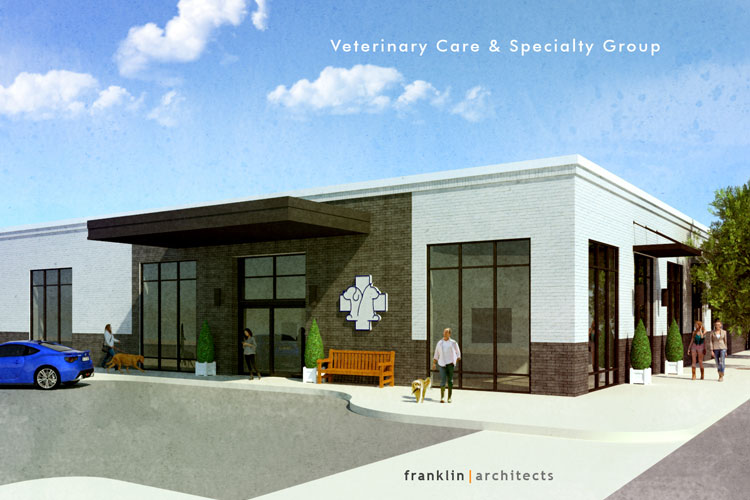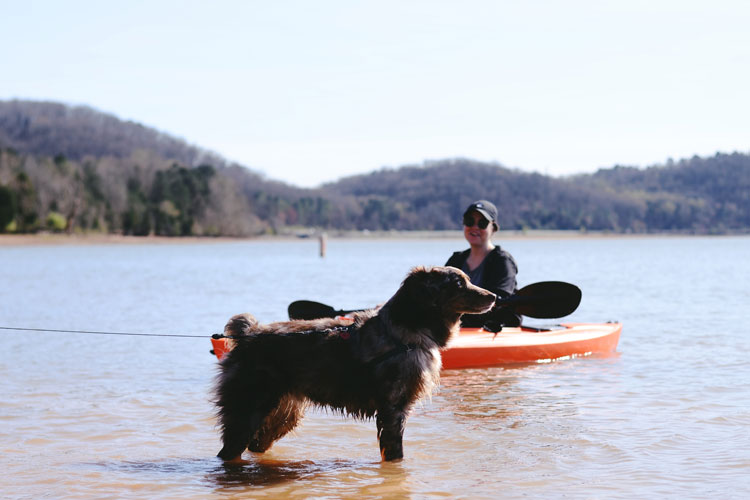Veterinary Care and Specialty Group
Veterinary Care and
Specialty Group
Chattanooga, TN
Available Positions
As ICU Lead Nurse your duties will include but are not limited to:
- Participating in patient rounds at the beginning and end of your shift with another lead – patient rounds should include every case, including signalment, date of intake, presenting complaint and current changes/medications or other pertinent information.
- ICU case load and team assessment – identifying the severity of cases and recognizing which cases require more intensive nursing care and knowing your team and who is the most comfortable and confident with the more difficult cases.
- Case and role assignments – Every shift it is your responsibility to designate the following roles: ICU nurse (at least 1, often 2), Triage and Float. Often Triage and Float can be shared by one individual, if intake is heavy, then Float can be assumed by the Lead.
- CPR assignments – Every shift you are responsible for assigning CPR roles
- Charges and Invoicing – every shift you are responsible for entering all charges and filling out charge sheets that occurred during the hours of your shift. Charge sheets should be filled out completely including the financial details at the top regarding estimates and current invoice amount. For hospitalizedpatients, charge sheet times are as follows: 8a – 5p, 5p – 12a and 12a – 8a for M-Th shifts. Weekend charges are as follows: 7a – 7p, 7p – 7a. Invoices for out-patient procedures and treatments such as lac repairs or sub-q fluids and injections are to be completed by Drs or leads and filled out on the charge sheet so thatownerscan check out with their pets in a timely fashion.
- Additionally, you are assisting or delegating those to assist the veterinarians in the Practice of Veterinary Medicine and Surgery, technician examinations, laboratory duties, treatments, drug dosages and dispensing, surgery duties, medical record notation and maintenance, assisting with in-patient and out-patient care and the associated charges, SmartFlow treatment sheet creation/assessment/maintenance, housekeeping duties throughout the facility including assigning and maintaining daily check-off list, administrative duties, inventory, OSHA awareness and compliance, extraordinary customer service and maintaining and instilling in your team a practical knowledge of the hospitals procedures, services and policies. The expected manner of every team member is always to maintain a professional demeanor, always use appropriate medical terminology and provide compassionate patient care.
ESSENTIAL JOB FUNCTION BASICS –
- Bending, stooping, crouching, kneeling, standing/walking on concrete floor up to 12 hours a day, typing, writing, balancing, twisting, squatting and rotating throughout the day.
- Moving animals from cage to cage, floor to floor, room to room. Restraining animals up to 200 pounds intermittently, lifting animals up to 50 pounds and lifting animals over 50 pounds with help.
- Ability to maintain an alertness level to keep safe from possible danger, resilience after disappointment or constructive feedback, compassion, to follow the ethical guidelines of your profession and this hospital, powers of keen observation for patient care, excellent reading/comprehension/legible writing skills, ability to negotiate with difficult people and problem solve and the ability to make rational and effective decisions.
- Keep team mentality in mind at all times, be prepared and willing to offer assistance and ask for assistance when needed, keep a positive professional outlook, completely abstain from gossip/negative observation regarding clients/team members or other professionals or other behavior that can whittle away at the healthy foundation of a team. Correct team attitudes and or communicate concerns to next level of managements (Rebecca, Betsy)
- Attend staff meetings including Lead Nurse meetings to provide feedback on your team and concerns, participate in hospital functions like open house, community efforts and special events. Be prepared to present topics at the occasional staff meetings. Attend periodic training meetings. Take advantage of online training videos including providing feedback about training areas your team needs to work on.
ENVIRONMENTAL WORKING CONDITIONS –
- Noise exposure from barking dogs and machinery.
- Danger of being bitten or scratched.
- Exposure to various risks including but not limited to; toxoplasmosis, gas anesthesia, chemotherapy drugs, radiation, drugs and chemicals under OSHA, rabies and euthanasia drugs as well as compassion fatigue.
TECHNICAL VETERINARY DUTIES –
- Admit patients for in-patient or out-patient procedures perform technician exams according to hospital procedure, fill prescriptions written and authorized by a DVM, log all controlled drugs and ensure they are appropriately charged for, taking vital signs and preparing vaccines.
- Able to collect all lab samples (urine via free catch or cystocentesis, phlebotomy, feces, skin scrapings, etc), prepare samples to send out or perform in-house tests, and maintain the laboratory log and equipment.
- Perform all patient treatments ordered by the attending DVM (medicating, TPR, close observation and charting, monitor intensive care patients, take and submit x-rays, use IV pumps, monitors, participate in CPR, anesthesia machines, Oxygen cage
- Induce anesthesia and intubate, monitor anesthesia, assess anesthetic risk and communicate clearly to DVM, prepare patient for surgery using hospital procedure, assist surgeon, calculate drug dosages related to surgery/treatment/anesthesia/critical care/emergency ( including CRI’s and fluid additives) and keep thorough surgery logs/sheets/anesthesia sheets.
- Maintain all surgical equipment, surgery packs, surgical inventory, cold trays and the surgery prep room and surgery suite.
- Create Estimates per Dr request and hospital policy and review with client. Answer questions regarding proposed treatments and surgeries, obtain signatures and transfer clients to clients service staff for financial exchange.
MEDICAL RECORDS –
- Be proficient in hospital software (Evet and SmartFlow), medical record charting, surgical monitoring charts, hospitalized patient charts and keep very thorough, legible and professional notes in each. Review the previous team member’s records in SmartFlow during your shift and help ensure the best accuracy and patient care.
- Be able to record TPR’s, medical history, patient status, procedures, treatments, findings, lab results, surgical notes, pre-surgical findings, anesthetic risk, all medications given or dispensed and complete discharge/homecare/report card instructions.
- Thoroughly record conversations with clients including all recommendations, declined recommendations or treatments. Manage your team and follow up on their communication records.
HOUSEKEEPING –
- Keep treatment/surgery/exam rooms clean and sanitary. Keep lab equipment well maintained – report any concerns to Jordan or Jenn K, be sure cages are cleaned on all surfaces, counters, refrigerators, bathrooms, floors and general environment are kept up to hospital standards. The surgery suite is to be kept extremely sanitary and closed –all surfaces disinfected after any ER Surgery. All instruments and tubing are to be cleaned, prepped, wrapped and when possible sterilized. Crash cart is to be kept stocked with updated non expired supplies on every shift – concerns or issues should be addressed with Rachel or Betsy
- Be prepared to perform routine kennel duties including walking, feeding, medicating, scrubbing, mopping, laundry and bathing.
ADMINISTRATIVE DUTIES –
- Filing all paper copies for scanning; invoicing, payments including payment plans, faxing, copying, creating various reports from the software, answer phone calls, explain appointment process for both IM and Surgery, understand cremation process and decedent hold process.
- Learn to exceed our client’s expectations, answer questions, return phone calls, offer tours and provide grief counsel.
INVENTORY –
- Maintain/monitor and reconcile controlled drugs. List needed inventory items on want list before the last one is taken, date any new bottle you open, monitor for expiration dates and redundant items. Know OSHA and MSDS rules. Understand chain of command and discuss any concerns with inventory manager.
- Be trained in the “Right to Know” OSHA requirements and follow all health/ safety/environmental emergency procedures.
- Know the location of all MSDSs, accident and injury log, self-aid kit and emergency phone numbers. Understand chain of command and who to contact if you or a member of your team are injured on the job. Understand rabies protocol including quarantine/vaccination/testing and the permanence and gravity of the situation including public health risk.
- Keep all secondary containers properly labeled.
MISCELLANEOUS –
Notify management of any damage or necessary repairs, be always observant of client satisfaction needs, report any client concerns to
management immediately.
**THIS IS BY NO MEANS A COMPLETE LIST. SOME TASKS MAY BE ASSIGNED TO A SPECIFIC STAFF MEMBER OR DEPARTMENT TO COMPLETE.
SOME TASKS MAY BE ADDED OR REMOVED. PROCEDURES AND POLICIES MAY CHANGE.**
As ICU Nurse your duties will include but are not limited to:
- Patient care of your assigned cases. This includes all hourly treatments in SmartFlow from medications to vitals. Additionally, it is the ICU nurse’s responsibility to record any medications or procedures and supplies on the shift’s charge sheet for that corresponding patient. For example, a sedated central line procedure should include the drugs for sedation, the central line kit and any suture used. If gas inhalant is required, it too is added to the charge sheet.
- Once the ICU nurse has completed their assigned patient’s hourly treatments, they are responsible for assisting the ICU team in keeping other patient’s treatments current. This requires communication with your fellow nurses and communicating with your team.
- Participation in CPR as assigned
- Additional duties include assisting the veterinarians in the Practice of Veterinary Medicine and Surgery, technician examinations, laboratory duties, treatments, drug dosages and dispensing, surgery duties, medical record notation and maintenance particularly as they apply to your assigned cases, assisting with in-patient and out-patient care, notating treatments appropriately in SmartFlow as well as reviewing previous notations by last shift, housekeeping duties throughout the facility including performing assigned duties on daily check-off list, administrative duties, inventory, OSHA awareness and compliance, extraordinary customer service and maintaining a practical knowledge of the hospitals procedures, services and policies. The hospital expectation of every team member is always to maintain a professional demeanor, strive for appropriate medical terminology and provide compassionate patient care. Additionally it is your duty to remember you are the patient care advocate and it is expected that you will voice concerns with treatments or the patient including difficulty with treatment administration, concerns about unaddressed nausea or hunger or pain with your lead and or your doctor on shift in a timely manner. This includes appropriate documentation in SmartFlow.
ESSENTIAL JOB FUNCTION BASICS –
- Bending, stooping, crouching, kneeling, standing/walking on concrete floor up to 12 hours a day, typing, writing, balancing, twisting, squatting and rotating throughout the day.
- Moving animals from cage to cage, floor to floor, room to room. Restraining animals up to 200 pounds intermittently, lifting animals up to 50 pounds and lifting animals over 50 pounds with help.
- Ability to maintain an alertness level to keep safe from possible danger, resilience after disappointment or constructive feedback, compassion, to follow the ethical guidelines of your profession and this hospital, powers of keen observation for patient care, excellent reading/comprehension/legible writing skills, ability to negotiate with difficult people and problem solve and the ability to make rational and effective decisions.
- Keep team mentality in mind at all times, be prepared and willing to offer assistance and ask for assistance when needed, keep a positive professional outlook, completely abstain from gossip/negative observation regarding clients/team members or other professionals or other behavior that can whittle away at the healthy foundation of a team. Report team attitude concerns to Lead and or communicate concerns to next level of managements (Rebecca, Betsy)
- Attend staff meetings including, participate in hospital functions like open house, community efforts and special events. Be prepared to present topics at the occasional staff meetings. Attend routine training meetings. Take advantage of online training videos.
ENVIRONMENTAL WORKING CONDITIONS –
- Noise exposure from barking dogs and machinery.
- Danger of being bitten or scratched.
- Exposure to various risks including but not limited to; toxoplasmosis, gas anesthesia, chemotherapy drugs, radiation, drugs and chemicals under OSHA, rabies and euthanasia drugs as well as compassion fatigue.
TECHNICAL VETERINARY DUTIES –
- Admit patients for in-patient or out-patient procedures perform technician exams according to hospital procedure, fill prescriptions written and authorized by a DVM, log all controlled drugs and ensure they are appropriately charged for, taking vital signs and preparing vaccines.
- Able to collect all lab samples (urine via free catch or cystocentesis, phlebotomy, feces, skin scrapings, etc), prepare samples to send out or perform in-house tests, and maintain the laboratory log and equipment.
- Perform all patient treatments ordered by the attending DVM (medicating, TPR, close observation and charting, monitor intensive care patients, take and submit x-rays, use IV pumps, monitors, participate in CPR, anesthesia machines, Oxygen cage• Induce anesthesia and intubate, monitor anesthesia, assess anesthetic risk and communicate clearly to DVM, prepare patient for surgery using hospital procedure, assist surgeon, calculate drug dosages related to surgery/treatment/anesthesia/critical care/emergency ( including CRI’s and fluid additives) and keep thorough surgery logs/sheets/anesthesia sheets.
- Maintain all surgical equipment, surgery packs, surgical inventory, cold trays and the surgery prep room and surgery suite.
- Review estimates with clients if the Lead and triage nurse are not available. Answer questions regarding proposed treatments and surgeries, obtain signatures and transfer clients to clients service staff for financial exchange.
MEDICAL RECORDS –
- Be proficient in hospital software (Evet and SmartFlow), medical record charting, surgical monitoring charts, hospitalized patient charts and keep very thorough, legible and professional notes in each. Review the previous team member’s records in SmartFlow during your shift and help ensure the best accuracy and patient care.
- Be able to record TPR’s, medical history, patient status, procedures, treatments, findings, lab results, surgical notes, pre surgical findings, anesthetic risk, all medications given or dispensed and complete discharge/homecare instructions.
- Thoroughly record conversations with clients including all recommendations, declined recommendations or treatments.
HOUSEKEEPING –
- Keep treatment/surgery/exam rooms clean and sanitary. Keep lab equipment well maintained – report any concerns to Lead, be sure cages are cleaned on all surfaces, counters, refrigerators, bathrooms, floors and general environment are kept up to hospital standards. The surgery suite is to be kept extremely sanitary and closed –all surfaces disinfected after any ER Surgery. All instruments and tubing are to be cleaned, prepped, wrapped and when possible sterilized. Crash cart is to be kept stocked with updated non expired supplies on every shift – concerns or issues should be addressed with Rachel or Betsy
- Be prepared to perform routine kennel duties including walking, feeding, medicating, scrubbing, mopping, laundry and bathing.
ADMINISTRATIVE DUTIES –
- Filing all paper copies for scanning; invoicing, payments including payment plans, faxing, copying, creating various reports from the software, answer phone calls, explain appointment process for both IM and Surgery, understand cremation process and decedent hold process.
- Learn to exceed our client’s expectations, answer questions, return phone calls, offer tours and provide grief counsel.
INVENTORY –
- List needed inventory items on want list before the last one is taken, date any new bottle you open, monitor for expiration dates and redundant items. Know OSHA and MSDS rules. Understand chain of command and discuss any concerns with Lead and/or inventory manager.
- Be trained in the “Right to Know” OSHA requirements and follow all health/ safety/environmental emergency procedures.
- Know the location of all MSDSs, accident and injury log, self aid kit and emergency phone numbers. Understand chain of command and who to contact if you or a member of your team are injured on the job. Report any injury to your Lead. Understand rabies protocol including quarantine/vaccination/testing and the permanence and gravity of the situation including public health risk and Health Department involvement.
- Keep all secondary containers properly labeled.
MISCELLANEOUS - notify management of any damage or necessary repairs, be always observant of client satisfaction needs, report any client concerns to management immediately.
**THIS IS BY NO MEANS A COMPLETE LIST. SOME TASKS MAY BE ASSIGNED TO A SPECIFIC STAFF MEMBER OR DEPARTMENT TO COMPLETE.
SOME TASKS MAY BE ADDED OR REMOVED. PROCEDURES AND POLICIES MAY CHANGE.*
As Float Nurse your duties will be varied, they will encompass every area of the hospital from triage to ICU. As float your duties include but are not limited to:
- Your primary focus is outpatient treatments and procedures such as sub-q fluids and injections, outpatient surgeries such as lack repairs, hotspot clip and cleans, sedated exams, etc. Any outpatient treatments you assist with, you are responsible for recording any drugs, supplies or treatments on the charge sheet and communicate with the lead regarding charges.
- Assisting ICU Nurses with their Patient care of all hospitalized cases – especially if they are behind.
- As a member of the ICU team, your participation in an assigned role in CPR is expected.
- AsFloat,you are the first back up for triage – if 2 clients arrive simultaneously or there is a tech to the front you are to ensure the patient history is taken in an appropriate amount of time and SOAP history is initiated in the computer with intake vitals and intake history.
- Additionally,your role includes assisting the veterinarians in the Practice of Veterinary Medicine and Surgery, technician examinations, laboratory duties, treatments, drug dosages and dispensing, surgery duties, medical record notation and maintenance particularly as they apply to your assigned cases, assisting with in-patient and out-patient care, notating treatments appropriately in SmartFlow as well as reviewing previous notations by last shift, housekeeping duties throughout the facility including performing assigned duties on daily check-off list, administrative duties, inventory, OSHA awareness and compliance, extraordinary customer service and maintaining a practical knowledge of the hospitals procedures, services and policies. The hospital expectation of every team member is always to maintain a professional demeanor, strive for appropriate medical terminology and provide compassionate patient care.Additionally,it is your duty to remember you are the patient care advocate and it is expected that you will voice concerns with treatments including difficulty with treatment administration, concerns about unaddressed nausea or hunger or pain with your lead and or your doctor on shift in a timely manner. This includes appropriate documentation in SmartFlow.
ESSENTIAL JOB FUNCTION BASICS –
- Maintain client communication and a professional environment
- Bending, stooping, crouching, kneeling, standing/walking on concrete floor up to 12 hours a day, typing, writing, balancing, twisting, squatting and rotating throughout the day.
- Moving animals from cage to cage, floor to floor, room to room. Restraining animals up to 200 pounds intermittently, lifting animals up to 50 pounds and lifting animals over 50 pounds with help.
- Ability to maintain an alertness level to keep safe from possible danger, resilience after disappointment or constructive feedback, compassion, to follow the ethical guidelines of your profession and this hospital, powers of keen observation for patient care, excellent reading/comprehension/legible writing skills, ability to negotiate with difficult people and problem solve and the ability to make rational and effective decisions.
- Keep team mentality in mind at all times, be prepared and willing to offer assistance and ask for assistance when needed, keep a positive professional outlook, completely abstain from gossip/negative observation regarding clients/team members or other professionals or other behavior that can whittle away at the healthy foundation of a team. Report team attitude concerns to Lead and or communicate concerns to next level of managements (Rebecca, Betsy)
- Attend staff meetings including, participate in hospital functions like open house, community efforts and special events. Be prepared to present topics at the occasional staff meetings. Attend routine training meetings. Take advantage of online training videos.
ENVIRONMENTAL WORKING CONDITIONS –
- Noise exposure from barking dogs and machinery.
- Danger of being bitten or scratched.
- Exposure to various risks including but not limited to; toxoplasmosis, gas anesthesia, chemotherapy drugs, radiation, drugs and chemicals under OSHA, rabies and euthanasia drugs as well as compassion fatigue.
TECHNICAL VETERINARY DUTIES –
- Admit patients for in-patient or out-patient procedures perform technician exams according to hospital procedure, fill prescriptions written and authorized by a DVM, log all controlled drugs and ensure they are appropriately charged for, taking vital signs and preparing vaccines.
- Able to collect all lab samples (urine via free catch or cystocentesis, phlebotomy, feces, skin scrapings, etc), prepare samples to send out or perform in-house tests, and maintain the laboratory log and equipment.
- Perform all patient treatments ordered by the attending DVM (medicating, TPR, close observation and charting, monitor intensive care patients, take and submit x-rays, use IV pumps, monitors, participate in CPR, anesthesia machines, Oxygen cage
- Induce anesthesia and intubate, monitor anesthesia, assess anesthetic risk and communicate clearly to DVM, prepare patient for surgery using hospital procedure, assist surgeon, calculate drug dosages related to surgery/treatment/anesthesia/critical care/emergency ( including CRI’s and fluid additives) and keep thorough surgery logs/sheets/anesthesia sheets.
- Maintain all surgical equipment, surgery packs, surgical inventory, cold trays and the surgery prep room and surgery suite.
- Review estimates with clients if the Lead and triage nurse are not available. Answer questions regarding proposed treatments and surgeries, obtain signatures and transfer clients to clients service staff for financial exchange.
MEDICAL RECORDS –
- Be proficient in hospital software (Evet and SmartFlow), medical record charting, surgical monitoring charts, hospitalized patient charts and keep very thorough, legible and professional notes in each. Review the previous team member’s records in SmartFlow during your shift and help ensure the best accuracy and patient care.
- Be able to record TPR’s, medical history, patient status, procedures, treatments, findings, lab results, surgical notes, pre surgical findings, anesthetic risk, all medications given or dispensed and complete discharge/homecare instructions.
- Thoroughly record conversations with clients including all recommendations, declined recommendations or treatments.
HOUSEKEEPING –
- Keep treatment/surgery/exam rooms clean and sanitary. Keep lab equipment well maintained – report any concerns to Lead, be sure cages are cleaned on all surfaces, counters, refrigerators, bathrooms, floors and general environment are kept up to hospital standards. The surgery suite is to be kept extremely sanitary and closed –all surfaces disinfected after any ER Surgery. All instruments and tubing are to be cleaned, prepped, wrapped and when possible sterilized. Crash cart is to be kept stocked with updated non expired supplies on every shift – concerns or issues should be addressed with Rachel or Betsy
- Be prepared to perform routine kennel duties including walking, feeding, medicating, scrubbing, mopping, laundry and bathing.
ADMINISTRATIVE DUTIES –
- Filing all paper copies for scanning; invoicing, payments including payment plans, faxing, copying, creating various reports from the software, answer phone calls, explain appointment process for both IM and Surgery, understand cremation process and decedent hold process.
- Learn to exceed our client’s expectations, answer questions, return phone calls, offer tours and provide grief counsel.
INVENTORY –
- List needed inventory items on want list before the last one is taken, date any new bottle you open, monitor for expiration dates and redundant items. Know OSHA and MSDS rules. Understand chain of command and discuss any concerns with Lead and/or inventory manager.
- Be trained in the “Right to Know” OSHA requirements and follow all health/ safety/environmental emergency procedures.
- Know the location of all MSDSs, accident and injury log, self-aid kit and emergency phone numbers. Understand chain of command and who to contact if you or a member of your team are injured on the job. Report any injury to your Lead. Understand rabies protocol including quarantine/vaccination/testing and the permanence and gravity of the situation including public health risk and Health Department involvement.
- Keep all secondary containers properly labeled.
MISCELLANEOUS - notify management of any damage or necessary repairs, be always observant of client satisfaction needs, report any client concerns to management immediately.
**THIS IS BY NO MEANS A COMPLETE LIST. SOME TASKS MAY BE ASSIGNED TO A SPECIFIC STAFF MEMBER OR DEPARTMENT TO COMPLETE.
SOME TASKS MAY BE ADDED OR REMOVED. PROCEDURES AND POLICIES MAY CHANGE.**
As Triage Nurse your duties will focus on the front/intake side of the clinic. You are the first technical staff the client sees. Your duties include but are not limited to:
- Take patient histories, perform technician exams, obtain signalment (species breed, age, gender, reproductive status), and a full set of vitals ( weight, temperature, HR, Pulse quality, RR/RE, mm/CRT) in the exam room or in some cases the lobby. Additionally, it is your responsibility to rapidly assess the need for a doctor’s intervention or the need to rush a patient to the ICU due to severity or change in disease process.
- It is then your responsibility to start a SOAP record in the computer on every patient you triage, (including those you bring to the back) and enter the intake vitals and presenting complaint history. Additionally, you are responsible for entering the exam fee on every patient you triage as well as any outpatient treatments you perform or assist with. It is your responsibility to maintain open communication with the doctor(s) on the floor as well as the lead nurse to help ensure invoices are complete on outpatient treatments.
- It is your responsibility to maintain a working knowledge of which client/patient is in which room to help the flow through the hospital. To assist with this, there is a whiteboard in the hallway behind reception. It is your responsibility to keep it current. You are also responsible along with the float (triage backup if multiple patients come in simultaneously) for maintaining the whiteboard and checking all new patient records for SOAPS – intake history and vitals.
- You must feel comfortable speaking with clients. You will deal with a full range of client emotions from angry to crying. You must feel comfortable with reading people and be sympathetic if not empathetic. Your goal is to keep intake running smoothly, assist the Drs with which case is next in which room, follow up with clients with updates and checking on patients if there is a delay on the dr coming into the room.
- Your secondary focus is outpatient treatments and procedures such as sub-q fluids and injections as well as filling medications to go home; you should avoid getting caught up in outpatient surgeries such as lack repairs, hotspot clip and cleans, sedated exams, etc. as you must remain available for what walks in next.
- As a member of the ICU team, participation in and assigned role in CPR is expected and as Triage you are the first one likely to step backupfront– if another critical arrives or there is a tech to the front you are to ensure that next patient history is taken in an appropriate amount of time and SOAP history is initiated in the computer with intake vitals and intake history.
- Additionally your role includes assisting the veterinarians in the Practice of Veterinary Medicine, technician examinations, laboratory duties, treatments, drug dosages and dispensing, medical record notation and maintenance particularly as they apply to your assigned cases, assisting with out-patient care, notating treatments appropriately in SmartFlow as well as reviewing previous notations by last shift, housekeeping duties throughout the facility including performing assigned duties on daily check-off list, administrative duties, inventory, OSHA awareness and compliance, extraordinary customer service and maintaining a practical knowledge of the hospitals procedures, services and policies. The hospital expectation of every team member is always to maintain a professional demeanor, strive for appropriate medical terminology and provide compassionate patient care. Additionally it is your duty to remember you are the patient care advocate and it is expected that you will voice concerns with treatments including difficulty with treatment administration, concerns about unaddressed nausea or hunger or pain with your lead and or your doctor on shift in a timely manner. This includes appropriate documentation in SmartFlow.
ESSENTIAL JOB FUNCTION BASICS –
- Maintain client communication and a professional environment; handle emotional situations with distraught clients routinely; maintain open communication with the Dr working the front of the house.
- Bending, stooping, crouching, kneeling, standing/walking on concrete floor up to 12 hours a day, typing, writing, balancing, twisting, squatting and rotating throughout the day.
- Moving animals from cage to cage, floor to floor, room to room. Restraining animals up to 200 pounds intermittently, lifting animals up to 50 pounds and lifting animals over 50 pounds with help.
- Ability to maintain an alertness level to keep safe from possible danger, resilience after disappointment or constructive feedback, compassion, to follow the ethical guidelines of your profession and this hospital, powers of keen observation for patient care, excellent reading/comprehension/legible writing skills, ability to negotiate with difficult people and problem solve and the ability to make rational and effective decisions.
- Keep team mentality in mind at all times, be prepared and willing to offer assistance and ask for assistance when needed, keep a positive professional outlook, completely abstain from gossip/negative observation regarding clients/team members or other professionals or other behavior that can whittle away at the healthy foundation of a team. Report team attitude concerns to Lead and or communicate concerns to next level of managements (Rebecca, Betsy)
- Attend staff meetings including, participate in hospital functions like open house, community efforts and special events. Be prepared to present topics at the occasional staff meetings. Attend routine training meetings. Take advantage of online training videos.
ENVIRONMENTAL WORKING CONDITIONS –
- Noise exposure from barking dogs and machinery.
- Danger of being bitten or scratched.
- Exposure to various risks including but not limited to; toxoplasmosis, gas anesthesia, chemotherapy drugs, radiation, drugs and chemicals under OSHA, rabies and euthanasia drugs as well as compassion fatigue.
TECHNICAL VETERINARY DUTIES –
- Admit patients for in-patient or out-patient procedures perform technician exams according to hospital procedure, fill prescriptions written and authorized by a DVM, log all controlled drugs and ensure they are appropriately charged for, taking vital signs and preparing vaccines.
- Able to collect all lab samples (urine via free catch or cystocentesis, phlebotomy, feces, skin scrapings, etc), prepare samples to send out or perform in-house tests, and maintain the laboratory log and equipment.
- Perform all patient treatments ordered by the attending DVM (medicating, TPR, close observation and charting, monitor intensive care patients, take and submit x-rays, use IV pumps, monitors, participate in CPR, anesthesia machines, Oxygen cage
- Induce anesthesia and intubate, monitor anesthesia, assess anesthetic risk and communicate clearly to DVM, prepare patient for surgery using hospital procedure, assist surgeon, calculate drug dosages related to surgery/treatment/anesthesia/critical care/emergency ( including CRI’s and fluid additives) and keep thorough surgery logs/sheets/anesthesia sheets.
- Maintain all surgical equipment, surgery packs, surgical inventory, cold trays and the surgery prep room and surgery suite.
- Review estimates with clients if the Lead and triage nurse are not available. Answer questions regarding proposed treatments and surgeries, obtain signatures and transfer clients to clients service staff for financial exchange.
MEDICAL RECORDS –
- Be proficient in hospital software (Evet and SmartFlow), medical record charting, surgical monitoring charts, hospitalized patient charts and keep very thorough, legible and professional notes in each. Review the previous team member’s records in SmartFlow during your shift and help ensure the best accuracy and patient care.
- Be able to record TPR’s, medical history, patient status, procedures, treatments, findings, lab results, surgical notes, pre surgical findings, anesthetic risk, all medications given or dispensed and complete discharge/homecare instructions.
- Thoroughly record conversations with clients including all recommendations, declined recommendations or treatments.
HOUSEKEEPING –
- Keep treatment/surgery/exam rooms clean and sanitary. Keep lab equipment well maintained – report any concerns to Lead, be sure cages are cleaned on all surfaces, counters, refrigerators, bathrooms, floors and general environment are kept up to hospital standards. The surgery suite is to be kept extremely sanitary and closed –all surfaces disinfected after any ER Surgery. All instruments and tubing are to be cleaned, prepped, wrapped and when possible sterilized. Crash cart is to be kept stocked with updated non expired supplies on every shift – concerns or issues should be addressed with Rachel or Betsy
- Be prepared to perform routine kennel duties including walking, feeding, medicating, scrubbing, mopping, laundry and bathing.
ADMINISTRATIVE DUTIES –
- Filing all paper copies for scanning; invoicing, payments including payment plans, faxing, copying, creating various reports from the software, answer phone calls, explain appointment process for both IM and Surgery, understand cremation process and decedent hold process.
- Learn to exceed our client’s expectations, answer questions, return phone calls, offer tours and provide grief counsel.
INVENTORY –
- List needed inventory items on want list before the last one is taken, date any new bottle you open, monitor for expiration dates and redundant items. Know OSHA and MSDS rules. Understand chain of command and discuss any concerns with Lead and/or inventory manager.
- Be trained in the “Right to Know” OSHA requirements and follow all health/ safety/environmental emergency procedures.
- Know the location of all MSDSs, accident and injury log, self aid kit and emergency phone numbers. Understand chain of command and who to contact if you or a member of your team are injured on the job. Report any injury to your Lead. Understand rabies protocol includingquarantine/vaccination/testing and the permanence and gravity of the situation including public health risk and Health Department involvement.
- Keep all secondary containers properly labeled.
MISCELLANEOUS - notify management of any damage or necessary repairs, be always observant of client satisfaction needs, report any client concerns to management immediately.
**THIS IS BY NO MEANS A COMPLETE LIST. SOME TASKS MAY BE ASSIGNED TO A SPECIFIC STAFF MEMBER OR DEPARTMENT TO COMPLETE.
SOME TASKS MAY BE ADDED OR REMOVED. PROCEDURES AND POLICIES MAY CHANGE.**
As ICU Lead Nurse your duties will include but are not limited to:
- Participating in patient rounds at the beginning and end of your shift with another lead – patient rounds should include every case, including signalment, date of intake, presenting complaint and current changes/medications or other pertinent information.
- ICU case load and team assessment – identifying the severity of cases and recognizing which cases require more intensive nursing care and knowing your team and who is the most comfortable and confident with the more difficult cases.
- Case and role assignments – Every shift it is your responsibility to designate the following roles: ICU nurse (at least 1, often 2), Triage and Float. Often Triage and Float can be shared by one individual, if intake is heavy, then Float can be assumed by the Lead.
- CPR assignments – Every shift you are responsible for assigning CPR roles
- Charges and Invoicing – every shift you are responsible for entering all charges and filling out charge sheets that occurred during the hours of your shift. Charge sheets should be filled out completely including the financial details at the top regarding estimates and current invoice amount. For hospitalizedpatients, charge sheet times are as follows: 8a – 5p, 5p – 12a and 12a – 8a for M-Th shifts. Weekend charges are as follows: 7a – 7p, 7p – 7a. Invoices for out-patient procedures and treatments such as lac repairs or sub-q fluids and injections are to be completed by Drs or leads and filled out on the charge sheet so thatownerscan check out with their pets in a timely fashion.
- Additionally, you are assisting or delegating those to assist the veterinarians in the Practice of Veterinary Medicine and Surgery, technician examinations, laboratory duties, treatments, drug dosages and dispensing, surgery duties, medical record notation and maintenance, assisting with in-patient and out-patient care and the associated charges, SmartFlow treatment sheet creation/assessment/maintenance, housekeeping duties throughout the facility including assigning and maintaining daily check-off list, administrative duties, inventory, OSHA awareness and compliance, extraordinary customer service and maintaining and instilling in your team a practical knowledge of the hospitals procedures, services and policies. The expected manner of every team member is always to maintain a professional demeanor, always use appropriate medical terminology and provide compassionate patient care.
ESSENTIAL JOB FUNCTION BASICS –
- Bending, stooping, crouching, kneeling, standing/walking on concrete floor up to 12 hours a day, typing, writing, balancing, twisting, squatting and rotating throughout the day.
- Moving animals from cage to cage, floor to floor, room to room. Restraining animals up to 200 pounds intermittently, lifting animals up to 50 pounds and lifting animals over 50 pounds with help.
- Ability to maintain an alertness level to keep safe from possible danger, resilience after disappointment or constructive feedback, compassion, to follow the ethical guidelines of your profession and this hospital, powers of keen observation for patient care, excellent reading/comprehension/legible writing skills, ability to negotiate with difficult people and problem solve and the ability to make rational and effective decisions.
- Keep team mentality in mind at all times, be prepared and willing to offer assistance and ask for assistance when needed, keep a positive professional outlook, completely abstain from gossip/negative observation regarding clients/team members or other professionals or other behavior that can whittle away at the healthy foundation of a team. Correct team attitudes and or communicate concerns to next level of managements (Rebecca, Betsy)
- Attend staff meetings including Lead Nurse meetings to provide feedback on your team and concerns, participate in hospital functions like open house, community efforts and special events. Be prepared to present topics at the occasional staff meetings. Attend periodic training meetings. Take advantage of online training videos including providing feedback about training areas your team needs to work on.
ENVIRONMENTAL WORKING CONDITIONS –
- Noise exposure from barking dogs and machinery.
- Danger of being bitten or scratched.
- Exposure to various risks including but not limited to; toxoplasmosis, gas anesthesia, chemotherapy drugs, radiation, drugs and chemicals under OSHA, rabies and euthanasia drugs as well as compassion fatigue.
TECHNICAL VETERINARY DUTIES –
- Admit patients for in-patient or out-patient procedures perform technician exams according to hospital procedure, fill prescriptions written and authorized by a DVM, log all controlled drugs and ensure they are appropriately charged for, taking vital signs and preparing vaccines.
- Able to collect all lab samples (urine via free catch or cystocentesis, phlebotomy, feces, skin scrapings, etc), prepare samples to send out or perform in-house tests, and maintain the laboratory log and equipment.
- Perform all patient treatments ordered by the attending DVM (medicating, TPR, close observation and charting, monitor intensive care patients, take and submit x-rays, use IV pumps, monitors, participate in CPR, anesthesia machines, Oxygen cage
- Induce anesthesia and intubate, monitor anesthesia, assess anesthetic risk and communicate clearly to DVM, prepare patient for surgery using hospital procedure, assist surgeon, calculate drug dosages related to surgery/treatment/anesthesia/critical care/emergency ( including CRI’s and fluid additives) and keep thorough surgery logs/sheets/anesthesia sheets.
- Maintain all surgical equipment, surgery packs, surgical inventory, cold trays and the surgery prep room and surgery suite.
- Create Estimates per Dr request and hospital policy and review with client. Answer questions regarding proposed treatments and surgeries, obtain signatures and transfer clients to clients service staff for financial exchange.
MEDICAL RECORDS –
- Be proficient in hospital software (Evet and SmartFlow), medical record charting, surgical monitoring charts, hospitalized patient charts and keep very thorough, legible and professional notes in each. Review the previous team member’s records in SmartFlow during your shift and help ensure the best accuracy and patient care.
- Be able to record TPR’s, medical history, patient status, procedures, treatments, findings, lab results, surgical notes, pre-surgical findings, anesthetic risk, all medications given or dispensed and complete discharge/homecare/report card instructions.
- Thoroughly record conversations with clients including all recommendations, declined recommendations or treatments. Manage your team and follow up on their communication records.
HOUSEKEEPING –
- Keep treatment/surgery/exam rooms clean and sanitary. Keep lab equipment well maintained – report any concerns to Jordan or Jenn K, be sure cages are cleaned on all surfaces, counters, refrigerators, bathrooms, floors and general environment are kept up to hospital standards. The surgery suite is to be kept extremely sanitary and closed –all surfaces disinfected after any ER Surgery. All instruments and tubing are to be cleaned, prepped, wrapped and when possible sterilized. Crash cart is to be kept stocked with updated non expired supplies on every shift – concerns or issues should be addressed with Rachel or Betsy
- Be prepared to perform routine kennel duties including walking, feeding, medicating, scrubbing, mopping, laundry and bathing.
ADMINISTRATIVE DUTIES –
- Filing all paper copies for scanning; invoicing, payments including payment plans, faxing, copying, creating various reports from the software, answer phone calls, explain appointment process for both IM and Surgery, understand cremation process and decedent hold process.
- Learn to exceed our client’s expectations, answer questions, return phone calls, offer tours and provide grief counsel.
INVENTORY –
- Maintain/monitor and reconcile controlled drugs. List needed inventory items on want list before the last one is taken, date any new bottle you open, monitor for expiration dates and redundant items. Know OSHA and MSDS rules. Understand chain of command and discuss any concerns with inventory manager.
- Be trained in the “Right to Know” OSHA requirements and follow all health/ safety/environmental emergency procedures.
- Know the location of all MSDSs, accident and injury log, self-aid kit and emergency phone numbers. Understand chain of command and who to contact if you or a member of your team are injured on the job. Understand rabies protocol including quarantine/vaccination/testing and the permanence and gravity of the situation including public health risk.
- Keep all secondary containers properly labeled.
MISCELLANEOUS –
Notify management of any damage or necessary repairs, be always observant of client satisfaction needs, report any client concerns to
management immediately.
**THIS IS BY NO MEANS A COMPLETE LIST. SOME TASKS MAY BE ASSIGNED TO A SPECIFIC STAFF MEMBER OR DEPARTMENT TO COMPLETE.
SOME TASKS MAY BE ADDED OR REMOVED. PROCEDURES AND POLICIES MAY CHANGE.**
As ICU Nurse your duties will include but are not limited to:
- Patient care of your assigned cases. This includes all hourly treatments in SmartFlow from medications to vitals. Additionally, it is the ICU nurse’s responsibility to record any medications or procedures and supplies on the shift’s charge sheet for that corresponding patient. For example, a sedated central line procedure should include the drugs for sedation, the central line kit and any suture used. If gas inhalant is required, it too is added to the charge sheet.
- Once the ICU nurse has completed their assigned patient’s hourly treatments, they are responsible for assisting the ICU team in keeping other patient’s treatments current. This requires communication with your fellow nurses and communicating with your team.
- Participation in CPR as assigned
- Additional duties include assisting the veterinarians in the Practice of Veterinary Medicine and Surgery, technician examinations, laboratory duties, treatments, drug dosages and dispensing, surgery duties, medical record notation and maintenance particularly as they apply to your assigned cases, assisting with in-patient and out-patient care, notating treatments appropriately in SmartFlow as well as reviewing previous notations by last shift, housekeeping duties throughout the facility including performing assigned duties on daily check-off list, administrative duties, inventory, OSHA awareness and compliance, extraordinary customer service and maintaining a practical knowledge of the hospitals procedures, services and policies. The hospital expectation of every team member is always to maintain a professional demeanor, strive for appropriate medical terminology and provide compassionate patient care. Additionally it is your duty to remember you are the patient care advocate and it is expected that you will voice concerns with treatments or the patient including difficulty with treatment administration, concerns about unaddressed nausea or hunger or pain with your lead and or your doctor on shift in a timely manner. This includes appropriate documentation in SmartFlow.
ESSENTIAL JOB FUNCTION BASICS –
- Bending, stooping, crouching, kneeling, standing/walking on concrete floor up to 12 hours a day, typing, writing, balancing, twisting, squatting and rotating throughout the day.
- Moving animals from cage to cage, floor to floor, room to room. Restraining animals up to 200 pounds intermittently, lifting animals up to 50 pounds and lifting animals over 50 pounds with help.
- Ability to maintain an alertness level to keep safe from possible danger, resilience after disappointment or constructive feedback, compassion, to follow the ethical guidelines of your profession and this hospital, powers of keen observation for patient care, excellent reading/comprehension/legible writing skills, ability to negotiate with difficult people and problem solve and the ability to make rational and effective decisions.
- Keep team mentality in mind at all times, be prepared and willing to offer assistance and ask for assistance when needed, keep a positive professional outlook, completely abstain from gossip/negative observation regarding clients/team members or other professionals or other behavior that can whittle away at the healthy foundation of a team. Report team attitude concerns to Lead and or communicate concerns to next level of managements (Rebecca, Betsy)
- Attend staff meetings including, participate in hospital functions like open house, community efforts and special events. Be prepared to present topics at the occasional staff meetings. Attend routine training meetings. Take advantage of online training videos.
ENVIRONMENTAL WORKING CONDITIONS –
- Noise exposure from barking dogs and machinery.
- Danger of being bitten or scratched.
- Exposure to various risks including but not limited to; toxoplasmosis, gas anesthesia, chemotherapy drugs, radiation, drugs and chemicals under OSHA, rabies and euthanasia drugs as well as compassion fatigue.
TECHNICAL VETERINARY DUTIES –
- Admit patients for in-patient or out-patient procedures perform technician exams according to hospital procedure, fill prescriptions written and authorized by a DVM, log all controlled drugs and ensure they are appropriately charged for, taking vital signs and preparing vaccines.
- Able to collect all lab samples (urine via free catch or cystocentesis, phlebotomy, feces, skin scrapings, etc), prepare samples to send out or perform in-house tests, and maintain the laboratory log and equipment.
- Perform all patient treatments ordered by the attending DVM (medicating, TPR, close observation and charting, monitor intensive care patients, take and submit x-rays, use IV pumps, monitors, participate in CPR, anesthesia machines, Oxygen cage• Induce anesthesia and intubate, monitor anesthesia, assess anesthetic risk and communicate clearly to DVM, prepare patient for surgery using hospital procedure, assist surgeon, calculate drug dosages related to surgery/treatment/anesthesia/critical care/emergency ( including CRI’s and fluid additives) and keep thorough surgery logs/sheets/anesthesia sheets.
- Maintain all surgical equipment, surgery packs, surgical inventory, cold trays and the surgery prep room and surgery suite.
- Review estimates with clients if the Lead and triage nurse are not available. Answer questions regarding proposed treatments and surgeries, obtain signatures and transfer clients to clients service staff for financial exchange.
MEDICAL RECORDS –
- Be proficient in hospital software (Evet and SmartFlow), medical record charting, surgical monitoring charts, hospitalized patient charts and keep very thorough, legible and professional notes in each. Review the previous team member’s records in SmartFlow during your shift and help ensure the best accuracy and patient care.
- Be able to record TPR’s, medical history, patient status, procedures, treatments, findings, lab results, surgical notes, pre surgical findings, anesthetic risk, all medications given or dispensed and complete discharge/homecare instructions.
- Thoroughly record conversations with clients including all recommendations, declined recommendations or treatments.
HOUSEKEEPING –
- Keep treatment/surgery/exam rooms clean and sanitary. Keep lab equipment well maintained – report any concerns to Lead, be sure cages are cleaned on all surfaces, counters, refrigerators, bathrooms, floors and general environment are kept up to hospital standards. The surgery suite is to be kept extremely sanitary and closed –all surfaces disinfected after any ER Surgery. All instruments and tubing are to be cleaned, prepped, wrapped and when possible sterilized. Crash cart is to be kept stocked with updated non expired supplies on every shift – concerns or issues should be addressed with Rachel or Betsy
- Be prepared to perform routine kennel duties including walking, feeding, medicating, scrubbing, mopping, laundry and bathing.
ADMINISTRATIVE DUTIES –
- Filing all paper copies for scanning; invoicing, payments including payment plans, faxing, copying, creating various reports from the software, answer phone calls, explain appointment process for both IM and Surgery, understand cremation process and decedent hold process.
- Learn to exceed our client’s expectations, answer questions, return phone calls, offer tours and provide grief counsel.
INVENTORY –
- List needed inventory items on want list before the last one is taken, date any new bottle you open, monitor for expiration dates and redundant items. Know OSHA and MSDS rules. Understand chain of command and discuss any concerns with Lead and/or inventory manager.
- Be trained in the “Right to Know” OSHA requirements and follow all health/ safety/environmental emergency procedures.
- Know the location of all MSDSs, accident and injury log, self aid kit and emergency phone numbers. Understand chain of command and who to contact if you or a member of your team are injured on the job. Report any injury to your Lead. Understand rabies protocol including quarantine/vaccination/testing and the permanence and gravity of the situation including public health risk and Health Department involvement.
- Keep all secondary containers properly labeled.
MISCELLANEOUS - notify management of any damage or necessary repairs, be always observant of client satisfaction needs, report any client concerns to management immediately.
**THIS IS BY NO MEANS A COMPLETE LIST. SOME TASKS MAY BE ASSIGNED TO A SPECIFIC STAFF MEMBER OR DEPARTMENT TO COMPLETE.
SOME TASKS MAY BE ADDED OR REMOVED. PROCEDURES AND POLICIES MAY CHANGE.*
As Float Nurse your duties will be varied, they will encompass every area of the hospital from triage to ICU. As float your duties include but are not limited to:
- Your primary focus is outpatient treatments and procedures such as sub-q fluids and injections, outpatient surgeries such as lack repairs, hotspot clip and cleans, sedated exams, etc. Any outpatient treatments you assist with, you are responsible for recording any drugs, supplies or treatments on the charge sheet and communicate with the lead regarding charges.
- Assisting ICU Nurses with their Patient care of all hospitalized cases – especially if they are behind.
- As a member of the ICU team, your participation in an assigned role in CPR is expected.
- AsFloat,you are the first back up for triage – if 2 clients arrive simultaneously or there is a tech to the front you are to ensure the patient history is taken in an appropriate amount of time and SOAP history is initiated in the computer with intake vitals and intake history.
- Additionally,your role includes assisting the veterinarians in the Practice of Veterinary Medicine and Surgery, technician examinations, laboratory duties, treatments, drug dosages and dispensing, surgery duties, medical record notation and maintenance particularly as they apply to your assigned cases, assisting with in-patient and out-patient care, notating treatments appropriately in SmartFlow as well as reviewing previous notations by last shift, housekeeping duties throughout the facility including performing assigned duties on daily check-off list, administrative duties, inventory, OSHA awareness and compliance, extraordinary customer service and maintaining a practical knowledge of the hospitals procedures, services and policies. The hospital expectation of every team member is always to maintain a professional demeanor, strive for appropriate medical terminology and provide compassionate patient care.Additionally,it is your duty to remember you are the patient care advocate and it is expected that you will voice concerns with treatments including difficulty with treatment administration, concerns about unaddressed nausea or hunger or pain with your lead and or your doctor on shift in a timely manner. This includes appropriate documentation in SmartFlow.
ESSENTIAL JOB FUNCTION BASICS –
- Maintain client communication and a professional environment
- Bending, stooping, crouching, kneeling, standing/walking on concrete floor up to 12 hours a day, typing, writing, balancing, twisting, squatting and rotating throughout the day.
- Moving animals from cage to cage, floor to floor, room to room. Restraining animals up to 200 pounds intermittently, lifting animals up to 50 pounds and lifting animals over 50 pounds with help.
- Ability to maintain an alertness level to keep safe from possible danger, resilience after disappointment or constructive feedback, compassion, to follow the ethical guidelines of your profession and this hospital, powers of keen observation for patient care, excellent reading/comprehension/legible writing skills, ability to negotiate with difficult people and problem solve and the ability to make rational and effective decisions.
- Keep team mentality in mind at all times, be prepared and willing to offer assistance and ask for assistance when needed, keep a positive professional outlook, completely abstain from gossip/negative observation regarding clients/team members or other professionals or other behavior that can whittle away at the healthy foundation of a team. Report team attitude concerns to Lead and or communicate concerns to next level of managements (Rebecca, Betsy)
- Attend staff meetings including, participate in hospital functions like open house, community efforts and special events. Be prepared to present topics at the occasional staff meetings. Attend routine training meetings. Take advantage of online training videos.
ENVIRONMENTAL WORKING CONDITIONS –
- Noise exposure from barking dogs and machinery.
- Danger of being bitten or scratched.
- Exposure to various risks including but not limited to; toxoplasmosis, gas anesthesia, chemotherapy drugs, radiation, drugs and chemicals under OSHA, rabies and euthanasia drugs as well as compassion fatigue.
TECHNICAL VETERINARY DUTIES –
- Admit patients for in-patient or out-patient procedures perform technician exams according to hospital procedure, fill prescriptions written and authorized by a DVM, log all controlled drugs and ensure they are appropriately charged for, taking vital signs and preparing vaccines.
- Able to collect all lab samples (urine via free catch or cystocentesis, phlebotomy, feces, skin scrapings, etc), prepare samples to send out or perform in-house tests, and maintain the laboratory log and equipment.
- Perform all patient treatments ordered by the attending DVM (medicating, TPR, close observation and charting, monitor intensive care patients, take and submit x-rays, use IV pumps, monitors, participate in CPR, anesthesia machines, Oxygen cage
- Induce anesthesia and intubate, monitor anesthesia, assess anesthetic risk and communicate clearly to DVM, prepare patient for surgery using hospital procedure, assist surgeon, calculate drug dosages related to surgery/treatment/anesthesia/critical care/emergency ( including CRI’s and fluid additives) and keep thorough surgery logs/sheets/anesthesia sheets.
- Maintain all surgical equipment, surgery packs, surgical inventory, cold trays and the surgery prep room and surgery suite.
- Review estimates with clients if the Lead and triage nurse are not available. Answer questions regarding proposed treatments and surgeries, obtain signatures and transfer clients to clients service staff for financial exchange.
MEDICAL RECORDS –
- Be proficient in hospital software (Evet and SmartFlow), medical record charting, surgical monitoring charts, hospitalized patient charts and keep very thorough, legible and professional notes in each. Review the previous team member’s records in SmartFlow during your shift and help ensure the best accuracy and patient care.
- Be able to record TPR’s, medical history, patient status, procedures, treatments, findings, lab results, surgical notes, pre surgical findings, anesthetic risk, all medications given or dispensed and complete discharge/homecare instructions.
- Thoroughly record conversations with clients including all recommendations, declined recommendations or treatments.
HOUSEKEEPING –
- Keep treatment/surgery/exam rooms clean and sanitary. Keep lab equipment well maintained – report any concerns to Lead, be sure cages are cleaned on all surfaces, counters, refrigerators, bathrooms, floors and general environment are kept up to hospital standards. The surgery suite is to be kept extremely sanitary and closed –all surfaces disinfected after any ER Surgery. All instruments and tubing are to be cleaned, prepped, wrapped and when possible sterilized. Crash cart is to be kept stocked with updated non expired supplies on every shift – concerns or issues should be addressed with Rachel or Betsy
- Be prepared to perform routine kennel duties including walking, feeding, medicating, scrubbing, mopping, laundry and bathing.
ADMINISTRATIVE DUTIES –
- Filing all paper copies for scanning; invoicing, payments including payment plans, faxing, copying, creating various reports from the software, answer phone calls, explain appointment process for both IM and Surgery, understand cremation process and decedent hold process.
- Learn to exceed our client’s expectations, answer questions, return phone calls, offer tours and provide grief counsel.
INVENTORY –
- List needed inventory items on want list before the last one is taken, date any new bottle you open, monitor for expiration dates and redundant items. Know OSHA and MSDS rules. Understand chain of command and discuss any concerns with Lead and/or inventory manager.
- Be trained in the “Right to Know” OSHA requirements and follow all health/ safety/environmental emergency procedures.
- Know the location of all MSDSs, accident and injury log, self-aid kit and emergency phone numbers. Understand chain of command and who to contact if you or a member of your team are injured on the job. Report any injury to your Lead. Understand rabies protocol including quarantine/vaccination/testing and the permanence and gravity of the situation including public health risk and Health Department involvement.
- Keep all secondary containers properly labeled.
MISCELLANEOUS - notify management of any damage or necessary repairs, be always observant of client satisfaction needs, report any client concerns to management immediately.
**THIS IS BY NO MEANS A COMPLETE LIST. SOME TASKS MAY BE ASSIGNED TO A SPECIFIC STAFF MEMBER OR DEPARTMENT TO COMPLETE.
SOME TASKS MAY BE ADDED OR REMOVED. PROCEDURES AND POLICIES MAY CHANGE.**
As Triage Nurse your duties will focus on the front/intake side of the clinic. You are the first technical staff the client sees. Your duties include but are not limited to:
- Take patient histories, perform technician exams, obtain signalment (species breed, age, gender, reproductive status), and a full set of vitals ( weight, temperature, HR, Pulse quality, RR/RE, mm/CRT) in the exam room or in some cases the lobby. Additionally, it is your responsibility to rapidly assess the need for a doctor’s intervention or the need to rush a patient to the ICU due to severity or change in disease process.
- It is then your responsibility to start a SOAP record in the computer on every patient you triage, (including those you bring to the back) and enter the intake vitals and presenting complaint history. Additionally, you are responsible for entering the exam fee on every patient you triage as well as any outpatient treatments you perform or assist with. It is your responsibility to maintain open communication with the doctor(s) on the floor as well as the lead nurse to help ensure invoices are complete on outpatient treatments.
- It is your responsibility to maintain a working knowledge of which client/patient is in which room to help the flow through the hospital. To assist with this, there is a whiteboard in the hallway behind reception. It is your responsibility to keep it current. You are also responsible along with the float (triage backup if multiple patients come in simultaneously) for maintaining the whiteboard and checking all new patient records for SOAPS – intake history and vitals.
- You must feel comfortable speaking with clients. You will deal with a full range of client emotions from angry to crying. You must feel comfortable with reading people and be sympathetic if not empathetic. Your goal is to keep intake running smoothly, assist the Drs with which case is next in which room, follow up with clients with updates and checking on patients if there is a delay on the dr coming into the room.
- Your secondary focus is outpatient treatments and procedures such as sub-q fluids and injections as well as filling medications to go home; you should avoid getting caught up in outpatient surgeries such as lack repairs, hotspot clip and cleans, sedated exams, etc. as you must remain available for what walks in next.
- As a member of the ICU team, participation in and assigned role in CPR is expected and as Triage you are the first one likely to step backupfront– if another critical arrives or there is a tech to the front you are to ensure that next patient history is taken in an appropriate amount of time and SOAP history is initiated in the computer with intake vitals and intake history.
- Additionally your role includes assisting the veterinarians in the Practice of Veterinary Medicine, technician examinations, laboratory duties, treatments, drug dosages and dispensing, medical record notation and maintenance particularly as they apply to your assigned cases, assisting with out-patient care, notating treatments appropriately in SmartFlow as well as reviewing previous notations by last shift, housekeeping duties throughout the facility including performing assigned duties on daily check-off list, administrative duties, inventory, OSHA awareness and compliance, extraordinary customer service and maintaining a practical knowledge of the hospitals procedures, services and policies. The hospital expectation of every team member is always to maintain a professional demeanor, strive for appropriate medical terminology and provide compassionate patient care. Additionally it is your duty to remember you are the patient care advocate and it is expected that you will voice concerns with treatments including difficulty with treatment administration, concerns about unaddressed nausea or hunger or pain with your lead and or your doctor on shift in a timely manner. This includes appropriate documentation in SmartFlow.
ESSENTIAL JOB FUNCTION BASICS –
- Maintain client communication and a professional environment; handle emotional situations with distraught clients routinely; maintain open communication with the Dr working the front of the house.
- Bending, stooping, crouching, kneeling, standing/walking on concrete floor up to 12 hours a day, typing, writing, balancing, twisting, squatting and rotating throughout the day.
- Moving animals from cage to cage, floor to floor, room to room. Restraining animals up to 200 pounds intermittently, lifting animals up to 50 pounds and lifting animals over 50 pounds with help.
- Ability to maintain an alertness level to keep safe from possible danger, resilience after disappointment or constructive feedback, compassion, to follow the ethical guidelines of your profession and this hospital, powers of keen observation for patient care, excellent reading/comprehension/legible writing skills, ability to negotiate with difficult people and problem solve and the ability to make rational and effective decisions.
- Keep team mentality in mind at all times, be prepared and willing to offer assistance and ask for assistance when needed, keep a positive professional outlook, completely abstain from gossip/negative observation regarding clients/team members or other professionals or other behavior that can whittle away at the healthy foundation of a team. Report team attitude concerns to Lead and or communicate concerns to next level of managements (Rebecca, Betsy)
- Attend staff meetings including, participate in hospital functions like open house, community efforts and special events. Be prepared to present topics at the occasional staff meetings. Attend routine training meetings. Take advantage of online training videos.
ENVIRONMENTAL WORKING CONDITIONS –
- Noise exposure from barking dogs and machinery.
- Danger of being bitten or scratched.
- Exposure to various risks including but not limited to; toxoplasmosis, gas anesthesia, chemotherapy drugs, radiation, drugs and chemicals under OSHA, rabies and euthanasia drugs as well as compassion fatigue.
TECHNICAL VETERINARY DUTIES –
- Admit patients for in-patient or out-patient procedures perform technician exams according to hospital procedure, fill prescriptions written and authorized by a DVM, log all controlled drugs and ensure they are appropriately charged for, taking vital signs and preparing vaccines.
- Able to collect all lab samples (urine via free catch or cystocentesis, phlebotomy, feces, skin scrapings, etc), prepare samples to send out or perform in-house tests, and maintain the laboratory log and equipment.
- Perform all patient treatments ordered by the attending DVM (medicating, TPR, close observation and charting, monitor intensive care patients, take and submit x-rays, use IV pumps, monitors, participate in CPR, anesthesia machines, Oxygen cage
- Induce anesthesia and intubate, monitor anesthesia, assess anesthetic risk and communicate clearly to DVM, prepare patient for surgery using hospital procedure, assist surgeon, calculate drug dosages related to surgery/treatment/anesthesia/critical care/emergency ( including CRI’s and fluid additives) and keep thorough surgery logs/sheets/anesthesia sheets.
- Maintain all surgical equipment, surgery packs, surgical inventory, cold trays and the surgery prep room and surgery suite.
- Review estimates with clients if the Lead and triage nurse are not available. Answer questions regarding proposed treatments and surgeries, obtain signatures and transfer clients to clients service staff for financial exchange.
MEDICAL RECORDS –
- Be proficient in hospital software (Evet and SmartFlow), medical record charting, surgical monitoring charts, hospitalized patient charts and keep very thorough, legible and professional notes in each. Review the previous team member’s records in SmartFlow during your shift and help ensure the best accuracy and patient care.
- Be able to record TPR’s, medical history, patient status, procedures, treatments, findings, lab results, surgical notes, pre surgical findings, anesthetic risk, all medications given or dispensed and complete discharge/homecare instructions.
- Thoroughly record conversations with clients including all recommendations, declined recommendations or treatments.
HOUSEKEEPING –
- Keep treatment/surgery/exam rooms clean and sanitary. Keep lab equipment well maintained – report any concerns to Lead, be sure cages are cleaned on all surfaces, counters, refrigerators, bathrooms, floors and general environment are kept up to hospital standards. The surgery suite is to be kept extremely sanitary and closed –all surfaces disinfected after any ER Surgery. All instruments and tubing are to be cleaned, prepped, wrapped and when possible sterilized. Crash cart is to be kept stocked with updated non expired supplies on every shift – concerns or issues should be addressed with Rachel or Betsy
- Be prepared to perform routine kennel duties including walking, feeding, medicating, scrubbing, mopping, laundry and bathing.
ADMINISTRATIVE DUTIES –
- Filing all paper copies for scanning; invoicing, payments including payment plans, faxing, copying, creating various reports from the software, answer phone calls, explain appointment process for both IM and Surgery, understand cremation process and decedent hold process.
- Learn to exceed our client’s expectations, answer questions, return phone calls, offer tours and provide grief counsel.
INVENTORY –
- List needed inventory items on want list before the last one is taken, date any new bottle you open, monitor for expiration dates and redundant items. Know OSHA and MSDS rules. Understand chain of command and discuss any concerns with Lead and/or inventory manager.
- Be trained in the “Right to Know” OSHA requirements and follow all health/ safety/environmental emergency procedures.
- Know the location of all MSDSs, accident and injury log, self aid kit and emergency phone numbers. Understand chain of command and who to contact if you or a member of your team are injured on the job. Report any injury to your Lead. Understand rabies protocol includingquarantine/vaccination/testing and the permanence and gravity of the situation including public health risk and Health Department involvement.
- Keep all secondary containers properly labeled.
MISCELLANEOUS - notify management of any damage or necessary repairs, be always observant of client satisfaction needs, report any client concerns to management immediately.
**THIS IS BY NO MEANS A COMPLETE LIST. SOME TASKS MAY BE ASSIGNED TO A SPECIFIC STAFF MEMBER OR DEPARTMENT TO COMPLETE.
SOME TASKS MAY BE ADDED OR REMOVED. PROCEDURES AND POLICIES MAY CHANGE.**
Veterinary radiologists are veterinarians with advanced training in the interpretation of diagnostic images. The primary duty of a radiologist in private practice is to evaluate medical diagnostic images to detect sites of injury or disease. Those acting as radiation oncologists utilize these scans to develop a course of treatment specifically for cancer patients.
Veterinary Radiologist Duties & Responsibilities
Being a veterinary radiologist requires expert skill with all forms of medical imaging, including:
- X-rays
- MRI scans
- CT scans
- Ultrasounds
- Nuclear medicine scans
- Radiographs
- Diagnosis and treatment based on images
Emergency and critical care veterinarians are specialists with advanced training in emergency medicine for animals. They're trained to perform life-saving interventions for emergency situations and critical illnesses in pets.
Duties
Emergency and critical care veterinarians are board certified to perform emergency procedures and monitor the recovery process. Routine duties for an emergency and critical care veterinarian in private practice include evaluating traumatic injuries, performing surgical procedures, evaluating diagnostic tests, compiling detailed case reports, supervising intensive care units, overseeing veterinary technicians or other support staff, and providing specialty consultations on referral cases. These board-certified veterinary specialists routinely deal with animals that are suffering the effects of physical trauma, shock, respiratory problems, cardiac problems, neurological issues, or other severe injuries that require immediate and intensive veterinary care. They often work in cooperation with primary care veterinarians to coordinate continuing medical care.
About Veterinary Care And Specialty Group
-
 Full
Full
Time -
 Health Care
Health Care
Benefits -
 401K
401K
Options -
 Paid
Paid
Time Off -
 Relocation
Relocation
Package -
 Personal Pet
Personal Pet
Discounts
If you want to work in a place where co-workers feel like family, and the staff is compassionate, dedicated and hardworking then VCSG is it! Our goal is to provide outstanding medical care for each family's beloved pet.
Chattanooga combines all the best aspects of living in a city but having immediate access to endless outdoor activities. Chattanooga continues to grow, but it will always have that small town feel. Downtown offers a vibrant art scene, restaurants/bars/breweries, festivals, shopping and more. We have many great public and private schools in the area and a plethora of activities to keep yourself or the family entertained. The city sits right on the Tennessee River with beautiful views of the surrounding mountains. Right outside VCSG’s door is picturesque Lookout Mtn and the Incline Railway. Nashville, Knoxville, Birmingham, and Atlanta are all within a two-hour drive, and the airport offers direct service to other major airports.
- Not Corporate
- Nearby Restaurants
- Privately Owned Hospital
- Urban Location
- Do NOT have non-competes
- Green Office
- 100% health insurance
- Brand New Facility
- 401K retirement plan
- Near Attractions
- Salary Paid
- Access to Public Transportation
- Hourly Paid
- Night Life Accessibility
- Free Parking
- Paid maternity/paternity leave
The City
Location

Terrain
Major Attractions
- Tennessee Aquarium
- Rock City Gardens
- Ruby Falls
- Hunter Museum of American Art
- Chattanooga Choo Choo
- Chattanooga Zoo
- Point Park
- Tivoli Theatre
- Coolidge Park
- Creative Discovery Museum
- Lookout Mtn. Incline Railway
- Ross's Landing
- Raccoon Mountain Caverns
- Haunted Ghost Tours
Weather
- Annual High Temperature
- Annual Low Temperature
- Annual Temperature
- Average Annual Rainfall
- Average Annual Snowfall
-
High
Low
Avg Temp -
High
Low
Avg Temp -
High
Low
Avg Temp -
High
Low
Avg Temp
Location

Populations
Chattanooga is located in Hamilton County, Tennessee on Nickajack Lake and Chickamauga Lake in East Tennessee. Chattanooga is located about 120 miles southwest of Knoxville and 120 miles northwest of Atlanta, Georgia. Chattanooga has a population of 180,557, which makes it the 4th largest city in Tennessee.
The city proper has a population density of 1,223 people per square mile (472/square kilometer). The larger Chattanooga metropolitan area has a population of 528,000. The Chattanooga Metropolitan Statistical Area (MSA), which includes Marion, Sequatchie, and Hamilton counties in Tennessee as well as Dade, Catoosa, and Walker counties in Georgia, had a 9% population growth over the last ten years.
MILE
DemoGraphics

- 56.6%
- 32.3%
- 6.1%
- 2.4%
- 2.2%
- 0.2%
- 0.1%
- 5.9%
- 19.6%
- 58.3%
- 16.2%
- 10,720
- 6.0%

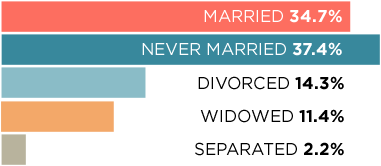
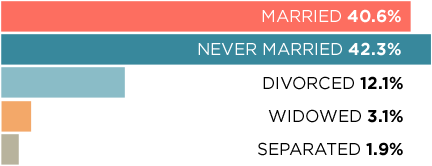
Education | Income | Employment
- 87.0%
- 29.4%
- $43,964
- 18.8%

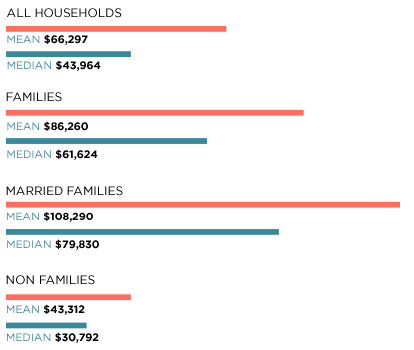
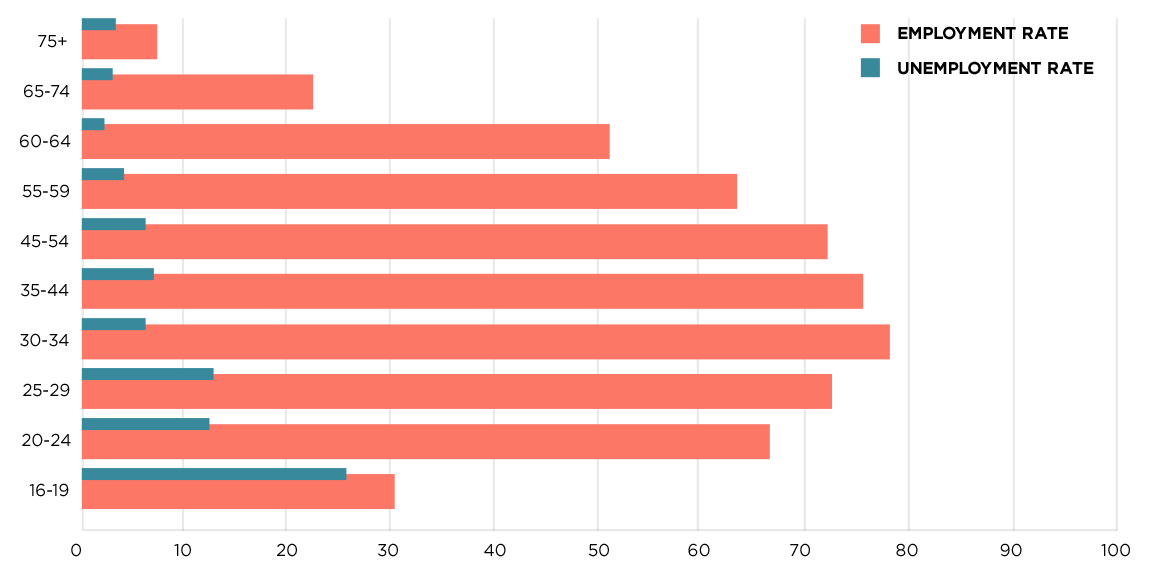
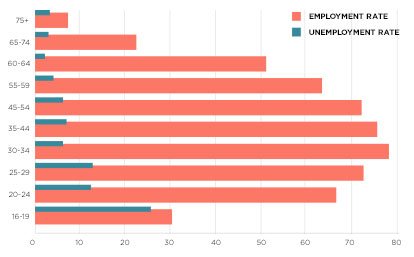
Housing
Gross Rent
- Married
- Female
- Male
- Non-Family
- 74%
- 52.6%
- 47.8%
- 42.2%
- 25%
- 64.6%
- 52.2%
- 57.8%
- 3.22
- 2.31
- 5.1%
- 0.6%
Monthly
Mortgage
- HomeOwners
- Renters
- 3.22
- 2.31
- 5.1%
- 0.6%
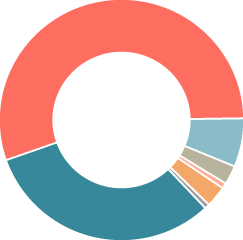
- 47.8%
- 34.5%
- 13.9%
- 3.8%
Transportation
Average travel time
to work
workers age 16 years+

-

- Chattanooga Metropolitan
Airport - Domestic
- Local Airport
- Chattanooga Metropolitan
-

- Hartsfield–Jackson Atlanta
International Airport - Domestic | International
- 2h 7m from Chattanooga
- Hartsfield–Jackson Atlanta
-
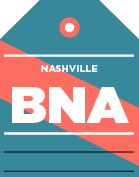
- Nashville
International Airport - Domestic | International
- 2h 1m from Chattanooga
- Nashville
Schools
- 172
- 56
- 37
- 37
- 45
- 3
- 172
- 220
Top Schools
-
Westview Elementary School
Hamilton County School District
Public, K-5 | 582 students
-
Chatt High Center For Creative Arts
Hamilton County School District
Public, 6-12 | 597 students
-
Chattanooga School for Arts and Sciences
Hamilton County School District
Public, K-12 | 673 students
-
Chattanooga School For The Liberal Arts
Hamilton County School District
Public, K-8 | 449 students
In the News
Notable Annual Events
- Chattanooga Market | Spring To Fall
- TN Whiskey Festival | Fall
- Iron Man Chattanooga | Fall
- 4 Bridges Art Festival | Spring
- Nightfall Concert Series | Fall
- Head of the Hooch | Fall
- Chattanooga Marathon | Spring
- 3 Sisters Bluegrass Festival | Fall
- Lookout Wild Film Festival | Winter
- Chattanooga Film Festival | Spring
- Moon River Music Festival | Fall
- Mainx24 | Winter
- Riverbend Music Festival | Summer
- Spectrum | Fall
- Chattacon | Winter
- Riverfront Nights Concert Series | Summer
- Startup Week | Fall
- Hunter Underground | Winter
